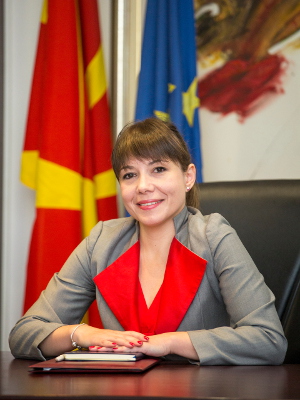Take Five: Gender equality is key to ending violence against women
Mila Carovska has been the Minister of Labour and Social Policy for the former Yugoslav Republic of Macedonia since May 2017. She is a long-standing human rights activist with extensive experience in the NGO sector and an independent expert in social protection, sexual reproductive rights and gender equality. The Ministry is a partner of UN Women in advancing the gender equality agenda and combatting violence against women in the country.Date:

The former Yugoslav Republic of Macedonia is a signatory country of the Istanbul Convention but is yet to ratify it. Recently, the Government reviewed the information needed for ratification. Following this encouraging news, what are the next steps for the Ministry of Labour and Social Policy?
The Ministry established a working group that will engage with the ratification process – particularly the preparation of a draft Law on Ratification of the Istanbul Convention. The working group is composed of representatives of all the relevant ministries and institutions, as well as representatives of civil society organizations that work in this field. Once the draft Law is prepared, it will be submitted to the Parliament, where I believe – and hope – it will be unanimously adopted.
As the lead Minister for gender equality, elimination of violence against women and anti-discrimination, what are the most urgent priorities that need to be addressed to protect women from all forms of gender-based violence?
There should be no tolerance for violence. It is necessary to convert this commitment into reality. This means that we will adopt a single legal framework that regulates all forms of gender-based violence – using the Law on Gender-Based Violence. Macedonia needs clear and unambiguous legal solutions that will prevent violence and protect victims. The second step will be to establish a network of standardized institutions that guarantees a minimum package of protection services, in accordance with the Convention. The Ministry has already started developing services, with support from NGOs, that provide crisis accommodation, shelters and a national SOS line for victims of domestic violence.
For instance, given that there were no existing services for victims of sexual violence in Macedonia, we initiated – along with the Ministry of Health and with the support of UNDP – three pilot sexual violence referral centres located within health institutions in Skopje, Kumanovo and Tetovo. The next step will be to develop procedural protocols for these centres.
How do you see the role of the joint UN Women–European Union Programme, ‘Implementing norms, changing minds’, in strengthening the capacity of service providers, and where do you see the role of civil society organizations (CSOs) in this process?
These activities cannot be realized unless CSOs are involved as partners in providing services for the prevention of and protection against gender-based violence. They will be supported through targeted grant schemes that aim to provide adequate and highly specialized support. The support that this programme provides to both CSOs and the Ministry is an enormous contribution towards the development of the necessary standards for providing protection and services for victims of gender-based violence.
You have proudly stated that you are a feminist, working in a Ministry responsible for the advancement of the gender equality agenda. Going forward, what are your plans for strengthening gender equality in the country?
Yes, I am a proud feminist and I believe that gender equality is the key to sustainable development. I am aware that many challenges lay ahead of us. Equality between women and men has systematically regressed in our country over the years, but my team and I have an ambitious agenda. We aim to effectively introduce a gender perspective in policy planning at national and local levels. Together with the Ministry of Information, Society and Administration, we will introduce e-modules on gender equality that will be mandatory for all civil servants. In cooperation with the Ministry of Finance, we will also work on introducing a gender perspective in budget planning.
As a gender equality advocate and feminist, how do you envision bringing about a change in minds and attitudes in Macedonian society?
Equality will not be achieved only by changing laws and strategies. We should all believe in and make an active contribution to the achievement of this goal. Change begins with ourselves, at home, and is then reflected in wider society. Adopting gender-sensitive language and overcoming stereotypes in education are some of the necessary changes we need to make. Furthermore, we need to work on transforming traditional gender stereotypes that we see daily in the media. The media, as part of our wider civil society, plays a key role in the fight against all forms of discrimination. We should work on promoting equal distribution of domestic care work and parental responsibilities, as well as supporting girls and women to engage in traditionally male dominated professions. The ministerial positions are an example, and I honestly hope that this perception will change. Of course, this is only possible through the active and continuous dedication of all stakeholders to the process of overcoming gender inequality, particularly women and men in leading roles in politics, education, the media and business.